|
|
|
Sort Order |
|
|
|
Items / Page
|
|
|
|
|
|
|
| Srl | Item |
| 1 |
ID:
140964
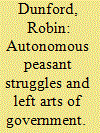

|
|
|
|
|
| Summary/Abstract |
I argue that self-organisation cannot account for how grassroots struggles can pursue transnational political change. I develop an account of some ‘left arts of government’ through which resistance is facilitated and organised without reintroducing oppressive and hierarchical forms of rule. I do so by focusing on the practices of autonomous peasant mobilisations. Land occupation movements facilitate the ability of people to engage in ongoing resistance on their own behalf. They organise resistance through horizontal communication and through transnational networks involving representative structures. Finally, peasant mobilisations engage with states and international institutions to solidify gains made.
|
|
|
|
|
|
|
|
|
|
|
|
|
|
|
|
| 2 |
ID:
151491
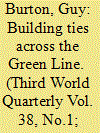

|
|
|
|
|
| Summary/Abstract |
In 2011 Palestinian youth joined together across the Green Line, demonstrating grassroots solidarity and a challenge to the elite consensus in favour of the two-state Oslo process. The movement drew inspiration from the concurrent Arab Spring and the Boycott, Divestment and Sanctions movement, organising joint demonstrations in Israel and the occupied Palestinian territory. However, the movement struggled to develop as a result of challenges regarding its objectives, strategy and representation, and of external threats from Israel and Palestinian political elites.
|
|
|
|
|
|
|
|
|
|
|
|
|
|
|
|
| 3 |
ID:
173910
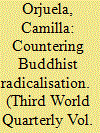

|
|
|
|
|
| Summary/Abstract |
Violence and hate speech endorsed by Buddhist monks against Muslim minorities in South and Southeast Asia have attracted global attention in recent years, and been the focus for a growing academic scholarship. This article turns the attention to peace activists, religious – including Buddhist – leaders and other civil society actors seeking to counter anti-Muslim agitation in Myanmar and Sri Lanka. Drawing on theories about social movements and countermovements, it analyses the diverse counter-forces, their activities and the obstacles they face. Doing so, the article contributes to an understanding of peacebuilding in religiously framed conflicts, and of the conditions for peace movements in an age of radicalisation and online activism. Based on interviews with civil society representatives and religious leaders, complemented with secondary sources, the study finds that although the peace movements are weaker and largely reactive to and restrained by the radical Buddhist nationalist movements, they constitute important counter-voices. The article also argues that the struggle between hate speech and counter speech in social media constitutes an important part of the movement–countermovement dynamics. Finally, the article suggests that theories on opposing movements can usefully be developed to enhance our understanding of mobilisation in different arenas in conflict-affected societies.
|
|
|
|
|
|
|
|
|
|
|
|
|
|
|
|
| 4 |
ID:
151504
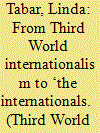

|
|
|
|
|
| Summary/Abstract |
This paper examines the formation of the concept of ‘the internationals’ in Palestine. The post-Oslo term began to be used in the second intifada to denote white solidarity activists in the colony. In tracing the rise of the concept, the paper charts some of the ways solidarity with the Palestinian people has been domesticated under the Oslo ‘peace process’. Situating and analysing the rise of the concept of ‘the internationals’ within the assemblage of apparatuses and ideological forces inscribed during Oslo, it explains how these material structures have contributed to shifting the notion and praxis of solidarity. Taking Third World internationalist and anti-imperialist feminist practices of solidarity as its starting point, the paper historicises and theorises some of the changes that have taken place over time. It offers an anti-colonial, anti-racist, feminist critique of the individualisation of solidarity and centres indigenous Palestinian perspectives. It concludes by surveying the ways Palestinians are creating alternatives and rebuilding international solidarity.
|
|
|
|
|
|
|
|
|
|
|
|
|
|
|
|
| 5 |
ID:
152779
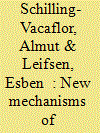

|
|
|
|
|
| Summary/Abstract |
In this special issue, the focus is on the dynamics and use of participatory mechanisms related to the rapid expansion of the extractive industries worldwide and the ways it increasingly affects sensitive natural environments populated by indigenous and other marginalised populations. We offer an empirically grounded and theoretically innovative comparative analysis of practices that aim to enhance participation, negotiation and influence as a response to the expansion of extractive industries. On the one hand, we question the assumption often presented in scholarly debates that participatory processes will contribute to making environmental governance not only more legitimate and effective, but will also lead to the empowerment of marginalised social groups. On the other, we draw on our empirical studies and insights to indicate ways local groups and their allies try to gain ownership and influence decision-making through a range of related participatory mechanisms, ranging from state-led or corporation-led processes like prior consultation and FPIC, compensation practices, participatory planning exercises and the participation in environmental impact assessments (EIAs) to community-led consultations, or community-based or controlled FPIC and impact assessment processes and struggles for community-based governance of natural resource uses.
|
|
|
|
|
|
|
|
|
|
|
|
|
|
|
|
| 6 |
ID:
144259
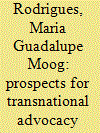

|
|
|
|
|
| Summary/Abstract |
The literature on transnational advocacy networks (TANs) suggests that they may be a valid option for activists in India, Brazil and South Africa (the members of the IBSA bloc) to coordinate efforts to influence their states’ foreign policy. Since its formation the IBSA bloc has formalised spaces for networking among governmental officials, business interests and academics. Yet there are no examples of TANs whose activism has occurred across IBSA, with the purpose of influencing the bloc’s policies. This case study of the challenges that Brazilian advocacy groups face in forging TANs with like-minded groups across IBSA sheds light on the challenges confronting activists and suggests ways of overcoming them.
|
|
|
|
|
|
|
|
|
|
|
|
|
|
|
|
| 7 |
ID:
155134
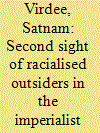

|
|
|
|
|
| Summary/Abstract |
This essay focuses attention on a current of socialist internationalism within imperial Britain and the formative role played by racialised outsiders of Irish Catholic, Jewish and Indian descent in actualising anti-racism and anti-imperialism. The collective memories of colonial subjugation combined with their outsider status within Britain itself endowed them with a second sight that enabled them to see through the usual fog of blood and belonging and act as a leavening agent connecting the struggles of workers of different ethnicities within Britain, as well as with those beyond. The essay concludes with a call to accommodate the emancipatory potential of the racialised outsider position in critical theory and practice. In particular, if contemporary Marxism is to remain relevant, it must be stretched to accommodate the specificity of racism and anti-racism without reducing it to class. The lessons for political practice appear equally compelling: emancipatory politics today need to accommodate how identifications of race are materially inscribed social realities which can facilitate resistance against racism. In that sense, socialist political practice will have to be more intersectional if a sustainable solidarity is to be forged between the ethnically diverse proletariat in the imperialist core, as well as with those beyond.
|
|
|
|
|
|
|
|
|
|
|
|
|
|
|
|
| 8 |
ID:
139229
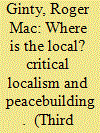

|
|
|
|
|
| Summary/Abstract |
This article is primarily a piece of conceptual scoping and considers the concept of ‘the local’ in relation to peacebuilding. It notes how the local is simultaneously held to blame for conflicts (as unenlightened, dangerous, uncivilised) and is also regarded as a saviour for international peace support operations. Local legitimacy, partnership and ownership of international peace interventions are seen as a fast track to success, sustainability and exit. The article navigates its way around this confused understanding of the local and argues that the local is a (not always helpful) construction. It further argues that, by applying a critical lens towards the concept of the local, we can seek to separate the concept of the local from territory and see it in terms of activity, networks and relationships. This has implications for practice and ‘field’ work.
|
|
|
|
|
|
|
|
|
|
|
|
|
|
|
|
|
|
|
|
|